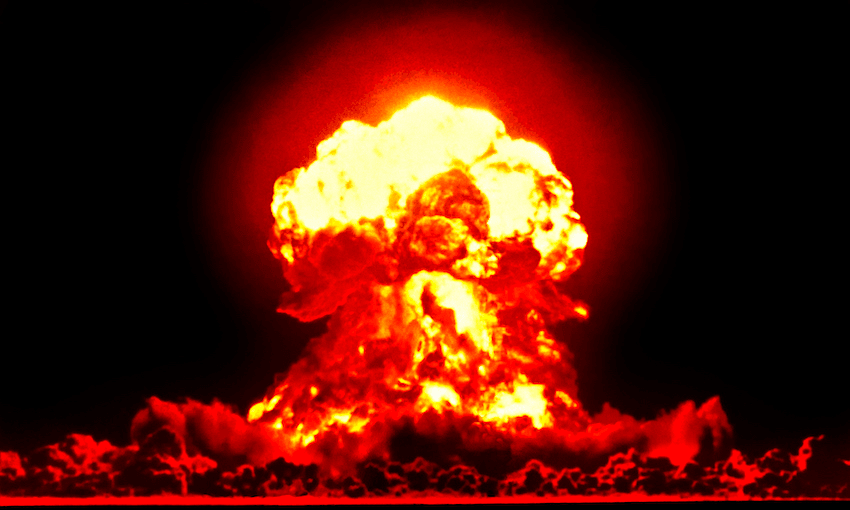The man who must not be named dominates all discussion, but there is cause for some optimism springing from the Treaty on the Prohibition of Nuclear Weapons, writes Beatrice Fihn of the International Campaign to Abolish Nuclear Weapons
Will we survive? That’s really the big question, right? Day-to-day, month-to-month, year-to-year. Will we make it? Will our kids be OK? And if we think beyond ourselves, will humanity survive?
Yes.
We will, but not because of the people making headlines.
The media’s obsession continues with the biggest economies and the loudest voices. There’s one gentlemen in particular I’m thinking of – he who must not be named. But his name is everywhere. Every interview I do starts and finishes with a question about this man.
He is obviously not our saviour, nor was his predecessor, but most likely he will also not be the destroyer of worlds. He is just a man. Yes, one of eight men and one woman with their finger on the button.
On the other side of the historic ledger we have billions of people from countries big and small arrayed against the weapons he and others wield. Some 122 nations supported the Treaty on the Prohibition of Nuclear Weapons at the UN in 2017. That treaty is moving swiftly to entry into force. It will become international law after 50 states have ratified it in their own capitals.
New Zealand has led the way and many Pacific states have stood shoulder to shoulder standing up not just for their people, but for the world. In an ironic twist, those from small states have been the most powerful voices, actually speaking for the people who live in the states who still base their security on the faulty promise of nuclear weapons. We are fighting on their behalf and on behalf of the world. We will win.
New Zealand and the Pacific nations have a special place in the nuclear story, and are a part of that key to winning. And by “winning”, I mean ensuring the survival of us all.
For decades a handful of nuclear-armed states locked the rest of the world out of their negotiations about our shared future. In the Pacific, the nuclear powers bombed your nations for “testing” because, they thought, nobody will mind. And when some people did mind and spoke up they bombed your protest ships, because they didn’t think your voice mattered. They valued lives in the Pacific less than the lives of their own citizens.
People were shut out of the conversation over our own fates, decided by just a handful on men behind closed doors.
That changed last year at the United Nations where a vast majority of states adopted the Treaty on the Prohibition of Nuclear weapons. The Treaty recognizes the grave humanitarian harm caused by these weapons and makes the possession of and threatening the use of nuclear weapons illegal.
New Zealand is one of 19 countries who have already ratified it. Once that number reaches 50 nations, the ban on nuclear weapons will become international law. If every Pacific nation ratifies it, the ban on nuclear weapons will be well on its way to becoming international law.
The Pacific has always been a leader on the nuclear weapons issue for decades. The Treaty of Rarotonga established a South Pacific Nuclear Free Zone Treaty. The voices from the Pacific continue to bear witness to the horrors of nuclear weapons testing.
New Zealand and the region may be free of nuclear weapons, but the region is not free of their effects.
No country is immune to the dangers posed by nuclear weapons. No far-flung corner of the world with offer adequate refuge from a nuclear war, no nation can claim immunity or neutrality from a conflict that involves nuclear-armed states.
It is incumbent on each nation to seize control of their own destiny before it is taken from them due to geopolitical events that they had no part in. Each nation can do just that by joining the growing community of states that are part of the Treaty that bans these horrific weapons that have no military utility. Each nation can refuse to be passive hostage to the whims of a few men with their finger on the button; only a late night tweet or insult away from plunging us all into a nightmare of their making.
The power of the Treaty is that it gives everyone an equal voice and clear path to protecting themselves and their loved ones from nuclear weapons. It brings democracy to nuclear disarmament, and in a somewhat ironic twist, it’s states like New Zealand that may save the citizens of massive countries like the US, UK and China. You are the voices for those who have been nearly rendered voiceless on this issue through political realities. David is speaking up to save Goliath.
In 2019, the Treaty on the Prohibition of nuclear weapons will become law. The next phase won’t happen overnight, but overtime the doers, the activists and bold leaders from small states will overwhelm those leaders clinging to the past.
We will reshape our future and save generations – really, all of of humanity. Not even Donald Trump (I know) can stop us.
Beatrice Fihn is the Executive Director of the International Campaign to Abolish Nuclear Weapons (ICAN), the 2017 Nobel Peace Prize-winning campaign coalition that works to prohibit and eliminate nuclear weapons. She accepted the Nobel Peace Prize and delivered the Nobel Lecture in Oslo on behalf of the campaign. Beatrice is visiting New Zealand with the Nobel Peace Prize from 2-7 December and holding public events in Wellington and Auckland. For information check her Twitter @beafihn.

